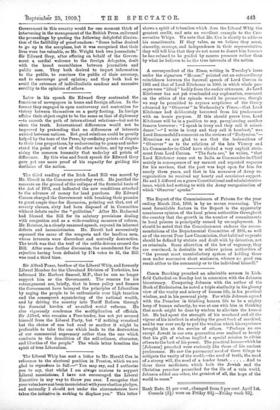A correspondent of the Times, writing in Tuesday's issue under
the signature " Memor," pointed out an extraordinary coincidence between the farewell speech of Lord Curzon in 1905 and that of Lord Kitchener in 1909, in which whole pas- sages were "lifted " bodily from the earlier utterance. As Lord Kitchener has not yet vouchsafed any explanation, comment on the ethics of the episode would be premature, though we may be permitted to express scepticism of the theory advanced by " Observer " in Wednesday's Times,—that Lord Kitchener had deliberately borrowed from his predecessor with an ironic, purpose. If this should prove true, Lord Kitchener will be in a position to say, paraphrasing another famous borrower : " I speak in irony and they call it coinci- dence."—" I write in irony and they call it bombast," was Lord Beaconsfield's comment on the reviews of " Endymion."— Meantime we are glad to see that the insinuations of " Observer " as to the relations of the late Viceroy and his Commander-in-Chief have elicited a very explicit state- ment from Lord Curzon. " The facts are," he writes, " that Lord Kitchener came out to India as Commander-in•Chief mainly in consequence of my earnest and repeated requests for his services, that the post was kept open for him for nearly three years, and that in his measures of Army re- organisation he received my hearty and consistent support. He and I differed on a grave Constitutional and administrative issue, which had nothing to with the Army reorganisation of which Observer' speaks."










































 Previous page
Previous page